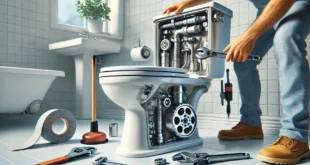Rodents, particularly rats and mice, are among the most common household pests. While these creatures may seem harmless, their presence can pose significant health and structural risks to your home. The hidden dangers of rodents are not always immediately visible, but they can cause long-term damage and spread disease, making it crucial for homeowners to address infestations swiftly and effectively.
In this article, we will discuss the hidden dangers of rodents in your home and offer tips on how to get rid of them. Whether you’re dealing with a mild issue or a severe infestation, understanding the risks and taking proactive measures will help protect your home and loved ones.
1. Health Risks Associated with Rodents
One of the biggest concerns when dealing with rodents is the potential health risks they bring. Rodents are known carriers of numerous diseases, which they can spread through their droppings, urine, saliva, and even bites. These diseases can cause serious health issues for humans, especially for children, elderly individuals, and those with weakened immune systems.
Some of the most common health risks associated with rodents include:
- Hantavirus: This virus is primarily spread through the urine, droppings, and saliva of infected rodents, particularly deer mice. Inhalation of dust particles contaminated with hantavirus can cause a potentially fatal respiratory disease known as Hantavirus Pulmonary Syndrome (HPS).
- Salmonella and E. Coli: Rodents are often found in areas where food is stored, and their droppings can contaminate surfaces and food products with harmful bacteria. These bacteria can lead to severe gastrointestinal issues, including diarrhea, vomiting, and fever.
- Leptospirosis: This bacterial infection is transmitted through contact with rodent urine or contaminated water. Symptoms can range from mild flu-like symptoms to more severe conditions, including liver damage, kidney failure, or meningitis.
- Rat-Bite Fever: Although rare, rodent bites or scratches can transmit this disease. Symptoms include fever, rash, and joint pain, which can progress to more severe complications if left untreated.
Rodents are also notorious for spreading parasites like fleas, ticks, and mites, which can further contribute to health problems. The risk of these diseases underscores the importance of taking action to prevent rodents from entering your home.
2. Property Damage Caused by Rodents
In addition to health risks, rodents can cause substantial damage to your home and belongings. Their constant gnawing can wreak havoc on both the structural integrity of your home and the items within it. Rodents’ teeth grow continuously, so they must gnaw on various materials to keep them from growing too long. This leads them to chew on:
- Electrical Wiring: Rodents are known to chew through electrical wires, which not only damages your wiring but also presents a fire hazard. Exposed wires can create short circuits or sparks, leading to electrical fires.
- Insulation: Rodents often make nests out of insulation, which can become damaged as they burrow through walls and attics. This can lead to a loss of insulation effectiveness, increasing energy costs for heating and cooling.
- Wood and Drywall: Rodents can damage wooden beams, furniture, and drywall by chewing and gnawing. This can weaken the structure of your home and lead to costly repairs.
- Stored Items: Rodents may destroy food, personal items, or stored belongings by chewing through packaging or creating nests from paper and fabric.
The damage rodents cause is not always immediately noticeable, which is why it’s essential to regularly inspect your home for signs of infestation.
3. Signs of a Rodent Infestation
Early detection is crucial in preventing a rodent infestation from becoming a major issue. Some of the common signs of rodents in your home include:
- Droppings: One of the most obvious signs of rodent activity is droppings. Rodent droppings are typically small, dark, and pellet-shaped. If you find droppings around food storage areas, under sinks, or in hidden corners, it’s a strong indication of an infestation.
- Gnaw Marks: As rodents gnaw on various materials, they often leave behind visible marks on furniture, walls, or baseboards. You may also find shredded paper or fabric used to build nests.
- Nesting Materials: Rodents will often gather shredded paper, fabric, or insulation to create nests in secluded areas. These nests may be found in attics, basements, behind walls, or inside furniture.
- Noises: If you hear scratching, scurrying, or squeaking sounds coming from inside walls, attics, or ceilings, it’s likely that rodents are moving around at night. These sounds are more noticeable during the quiet hours of the night when rodents are most active.
- Visible Sightings: While rodents are nocturnal and tend to stay out of sight, you may catch glimpses of them darting across the floor or sneaking into dark corners. Seeing a rodent during the day can be a sign of a significant infestation.
If you notice any of these signs, it’s important to act quickly to prevent the infestation from spreading.
4. How to Get Rid of Rodents
If you suspect or confirm that you have a rodent problem in your home, it’s important to take swift and effective action to eliminate them. Below are some steps you can take to remove rodents from your home:
Seal Entry Points
The first step in rodent control is to seal off all possible entry points. Rodents can squeeze through incredibly small openings, so inspect your home thoroughly for gaps, cracks, or holes. Pay special attention to areas around windows, doors, vents, and utility pipes. Seal these openings using caulk, steel wool, or metal mesh to ensure rodents cannot enter your home.
Set Traps
Trapping is one of the most effective ways to catch and remove rodents. There are several types of traps available, including:
- Snap Traps: These are the classic traps that kill rodents instantly upon contact. Place them in areas where you’ve noticed rodent activity, such as near droppings or gnaw marks.
- Live Traps: These traps catch rodents alive, allowing you to release them far from your home. If you choose this method, make sure to check the traps regularly to avoid harming the trapped rodent.
- Glue Traps: These traps use sticky surfaces to capture rodents. However, they can be inhumane and are not recommended as the primary method of control.
Use Rodenticides
Rodenticides are poisons designed to kill rodents after ingestion. However, they should be used with caution, especially if you have pets or small children. If you choose to use rodenticides, place them in bait stations or in areas where they are less likely to be accessed by non-target animals.
Eliminate Food Sources
Rodents are attracted to food, so it’s important to remove any available food sources. Store food in airtight containers, clean up crumbs and spills immediately, and regularly empty trash bins. Keep pet food in sealed containers and avoid leaving food out overnight.
Maintain a Clean Home
A clean home is less inviting to rodents. Regularly clean under furniture, in attics and basements, and around appliances where rodents may hide. Remove clutter and seal any cracks or gaps where they could make nests.
Seek Professional Help
If your rodent problem persists or is too large to handle on your own, consider contacting a professional pest control service. Experts like The Pest and Termite Co, which provide pest control services in Gold Coast, have the tools, experience, and knowledge to identify rodent entry points, eliminate infestations, and prevent future problems.
5. Prevent Future Rodent Infestations
Once you’ve addressed the current infestation, it’s important to take steps to prevent future rodent problems. This includes sealing entry points, keeping food sources secure, and maintaining a clean home. Additionally, consider using rodent repellents, such as ultrasonic devices or natural deterrents like peppermint oil, to make your home less attractive to rodents.
Conclusion
Rodents may seem like a minor inconvenience, but the hidden dangers they pose to your health, property, and peace of mind are significant. By understanding the risks and signs of rodent infestations and taking proactive measures to get rid of them, you can protect your home and loved ones. Whether you choose to tackle the issue yourself or seek professional help, timely action is key to preventing further damage and maintaining a safe, rodent-free home.
 Our Gateway to Insightful Blogging Exploring Ideas, Sharing Knowledge, Inspiring Minds
Our Gateway to Insightful Blogging Exploring Ideas, Sharing Knowledge, Inspiring Minds



